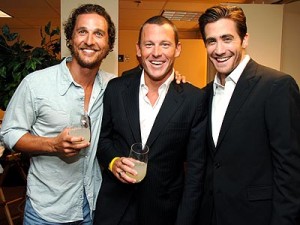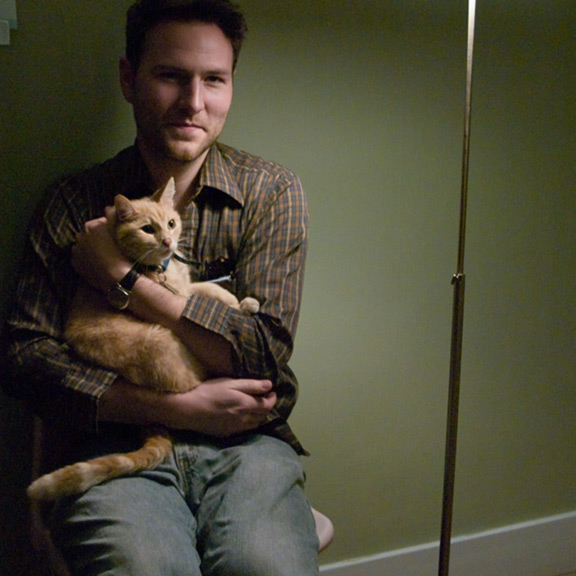Happy Birthday John Ashbb [to release it from its condition of hardness you will have to take apart the notion of you]
… To be your breath as it is taken in and shoved out. Then, quietly, it would be as objects placed along the top of a wall: remembering just how the light stood on the water that time. Inside each other, moving upward
like penance.
like the face on a deflated balloon, shifted into wrinkles, permanent and
matter-of-fact.
Because life is short
We must remember to keep asking it the same question
Until the repeated question and the same silence become answer
In words broken open and pressed to the mouth
And the last silence reveal the lining,
the people who timidly inhabit it, the fuzzy first thought that gets started in you and then there’s no stopping it.
But it is your landscape, the proof that you are there.
Interview with Lindsay Hunter
Lindsay Hunter, author of the brilliant and beautiful collection Don’t Kiss Me (buy it here, or, you know, wherever) was kind enough to talk with me about the book and her writing generally. We did it over Google’s hangout software, which apparently mirrors your own image as you’re chatting, which led me to believe that the book would be flipped horizontally when I showed it to you, the viewer. So that’s what that’s about. I’m also super awkward in real time, so that’s what that’s about. I hope Lindsay enjoyed the conversation, and I hope you will find and read her awesome book.
Normally I suggest just plugging in the headphones for these, as they are not designed to be visual feasts, but Lindsay does some incredible camera work, and we get to meet both her dog and dog walker. So that’s something worth seeing.
REDEMPTION FOUR: BETTER THAN EVER OR BETTER OFF DEAD?
In this mini-series the saga of redemption, as frequently manifested in the form of “comebacks,” is investigated. REDEMPTION ONE is here. REDEMPTION TWO is here. REDEMPTION THREE is probably around, too.
This is the last redemption.
II. EMPIRICAL EVIDENCE
c. How it Should Be: Identities Dismantled, Redemption In Transition
The projection of specific moments of the lives of public people following their death results in redemption of a dubious ethical nature. A drastically similar technique, however, can be utilized to facilitate winning the popular support for the redemption-seekers who possess the social acumen to manipulate their experiences. The most insightful public individuals are capable to redeploy the past to “manipulate” the present and pragmatize their intended vision. When predicting how the audience will interpret a series of events, public figures can act accordingly to enter the public consciousness. Once such an immersion becomes possible, the public person can determine how to use it efficiently.
LANCE ARMSTRONG
The most challenging occurrences of public people’s demise appear when their public personas are perceived as an honest extension of his/herself and they act in a way that jeopardizes both their professional and private life. Lance Armstrong’s documented steroid use offers an illustrious example. Armstrong’s professional career lost its significance the moment his distinctions and awards were taken back. Armstrong’s nebulous actions as an athlete led to a discourse on the morality of his philanthropic work and the LIVESTRONG initiative. In such multifaceted cases, the redemption of an individual is most likely to stem from the segmentation of a public person’s identities in the many distinct roles of their private lives and the distinct roles of their public presence. The individual is then responsible to navigate the best means to move towards the optimal level possible, using either sphere to move further ahead as a public person. This process is similar to the crafting of a reputational mosaic that highlights the positive, without hiding the negative.
In what appears to be a part of the distant past, public individuals held the power to control the simulations the media projected. Following events that posed a reputational risk, “damage control” functioned as a means to sugarcoat a harsher reality in the lives of public people.The field of public relations serves an anachronistic idea of how to control a positive public perception, as an endeavor to create a perfect image is no longer the best route to gaining the support of hoi polloi. The most resourceful public image is one that will be largely viewed as authentic.
Naturally, even this “authenticity” may be of a somewhat contrived or smoothly manipulated composition. For instance, the redemptional strength of the Weiner narrative lies upon the way Weiner and Abedin are presenting their private life to the public. The truth is that we–as the audience–do not know what is going on in their private lives, or if they are sharing a bedroom. What if the personal and the public do not align, in Weiner’s reality? He wouldn’t be the first politician to create a bricolage of his private life to ameliorate his public image. READ MORE >
REDEMPTION THREE: BETTER THAN EVER OR BETTER OFF DEAD?
In this mini-series the saga of redemption, as frequently manifested in the form of “comebacks,” is investigated. REDEMPTION ONE is here. and REDEMPTION TWO is here. Read REDEMPTION ONE before REDEMPTION THREE, inserting REDEMPTION TWO between them.

John Galliano, redeemable or not, is alive.
II. EMPIRICAL EVIDENCE
b. Better Off Dead? Two cases of Dubious Post-Mortem Redemption
As the example of time illustrates in the case of Adler, exogenous elements factor in whilst public figures are on a path towards redemption. Interestingly, the most practical way to pursue redemption might be dying. The death of a public person continues–to this day of non-secular dimensions–to make the majority of media consumers feel a predominant desire to respect their deceased status. This theory effectively extends to the redemption of some of the most controversial individuals.
MARGARET THATCHER
Margaret Thatcher’s death sparked a discourse on the very topic of the appropriateness of global media industries using unnecessary euphemisms following the passing of public figures. The mentality of “one must not speak ill of the dead” looms as a dangerous approach when it pertains to political leaders. By picking and choosing the legacy of politically-engaged people, those who pick and choose create a false record of the events that carved the lives of others.
Thatcher’s individual saga as a leadership paradigm certainly includes grand successes. She was elected thrice as the Prime Minister of the UK and was both the first female PM of the UK and first female leader of a Western country in recent history. Additionally, she actively introduced her set of conservative, nationalist political beliefs, widely known as Thatcherism.
Heated debate surrounded Thatcherism, as well as Thatcher herself. For media outlets to neglect the heavy criticism she received–and often persuasively argued against–because of her death appears callous, but also oxymoronic at its core subject, because it contradicts the nature of the person Thatcher was: a self-proclaimed “conviction politician.” Her priority was staying true to her values, despite the anticipated reaction her values would yield. It seems highly unlikely Thatcher herself would hesitate to speak ill of the dead. READ MORE >
A SMALL RESPECTFUL ARGUMENT WITH HELEN DEWITT, BUT WITHOUT HER
Last week when I emailed back an editor at a very fine, highbrow publication I responded to the way she closed her email by letting her know I actually have absolutely no intention of ever submitting my work to her again. She moved on to provide her apologies, which I guess should have placated me, but I kindly declined the apology, too. I forwarded the email exchange to a friend.
“You are crazy,” a friend responded.
I really like Helen DeWitt for many reasons, primarily because a friend, happening to be the very same one, once told me: “She is crazy. She gets in huge fights with her editors and doesn’t talk to them for years and wants her product to be exactly the way she envisions it.” If anything, I think that this is very not crazy at all; it makes the most complete sense to me that someone talented and verbally rigorous but never anything near verbose wants things the way she deems the most compelling. She edits herself more than enough, thank you very much.
There is a sentence somewhere [1] in DeWitt’s Lightning Rods asking: “Why does coffee never taste as good as it smells?” The question is a statement, and I do take it personally. Reading such a sentence fervently awakens my contrarian nature.[2] I have always liked coffee truly very much. As a child, I was undoubtedly the youngest one to bring coffee mugs to school, an action or habit eventually leading to phone calls to my parents from the school’s administration about how their son is a bad influence on other kids. Other kids wanted to drink coffee too. I was a trendsetter! How did the other kids know that it was coffee that the drink was in my silver traveller’s mug? It was the scent. The caffeinated aroma. The way its hot steam perpetrated the sterile educational environment. It smelled good.
A friend [3] once told me that there are only two ways to enter our bodies: sex and food. She then talked about abjection, but I kept thinking about our smells, smells and how smells too can be warm.
I have given it a lot of rational, logic-oriented thought and I have decided the reason I began drinking coffee was its warmth. It is possible that the average–or actually the median–reader assumed this would have been about the taste and how things are delicious and the flavor trip to Ethiopia and Costa Rica. But it is not, it is about warmth. The median reader–but definitely not the average reader, because the average does not think about things this much, if we are willing to be honest–wonders why coffee’s warmth is better than Nesquik’s. I would disagree, respectfully, with this median reader because there is a textural warmth to coffee that hot Nestle chocolate will never get near to at all. [4] In conclusion, I think coffee is always as good as it smells. Sometimes, my problem with coffee is that its warmth cannot be paralleled by its aromatic odor, or anything else at all.
Even if I disagree with Helen DeWitt on this tiny little section, I do think everyone should read Lightning Rods. The book is all about finding warmth, without at any point being warm itself. It is a book full of scents, but in the end I think we could all agree what is best is the possibility of warmth, even if it seems impossible.
NOTES
[1] The somewhere being page 71 if one needs be precise, read that page after reading 70 to achieve the optimal reader’s satisfaction.
[2] Recently, or at least not very long ago, I was questioned extensively and aggressively about this character flaw of mine. The largest issue I had with the accusation was the intrinsic flaw in denying it. My immediate paralysis in realizing that presenting a cajoling case was impossible was a relief. Internally I disagreed, but externalizing my disagreement was beyond the point, or actually it was the point, exactly.
[3] Still exactly the same friend in all cases. I guess we are close, or this piece would imply so.
[4] Not much later in my life my parents started receiving calls about how I was a bad influence on other kids: they, too, wanted to smoke. In my defense, I only did it because it kept me warm and made the coffee smell better, especially as its smell pertains to its warmth. My mom told the administration she has taught me well enough, thank you very much.
July 5th, 2013 / 11:16 am
REDEMPTION TWO: BETTER THAN EVER OR BETTER OFF DEAD?
In this mini-series the saga of redemption, as frequently manifested in the form of “comebacks,” is investigated. REDEMPTION ONE is here.
In honor of Lindsay Lohan’s birthday, REDEMPTION TWO arrives early.
II. EMPIRICAL EVIDENCE
a. Better Than Ever: Two Cases of Successful Redemption
ANTHONY WEINER
If anyone successfully gave more than enough of himself to the public, it was Anthony Weiner. With explicit twitpics some of us never saw and some of you will never forget, the former congressman’s actions led to a shameful resignation following the virtual “unfaithfulness” to his spouse, Huma Abedin[1]. Weiner did not code the public humiliation of his private life as the ending of his career. On the contrary, he interpreted, and continuously interprets, his public mistake as an opportunity for future growth and greater strength.
The married lives of politicians have always been crucial foundations to their public perception. An extensive cover interview for NYT Magazine in April depicted Weiner and Abedin’s marriage as a normal one, still recognizing the vast impact of the incident on their marriage. Particularly, the demise of the power-couple as it was in quest of a private truth–whether Weiner’s account was hacked–became the first step to achieve a private, family-based redemption. After returning to trust privately, the next challenge for the couple became reaching the redemption that would mark its return to political respectability and place Weiner’s wrongdoings in the past.
Following the scandal, Weiner’s course of action has primarily worked to his advantage, at least according to the press. He asserted that the reason he initially lied was to avoid telling Huma. Once the lie was undeniable, he owned up to his mistake by attributing it to an obscure, but under no circumstances unrealistic, cybersex habit. The fact that he did not realize the sexual acts in question, but constrained himself to the imaginary, undoubtedly ameliorated the position he found himself in following the event. READ MORE >
REDEMPTION ONE: BETTER THAN EVER OR BETTER OFF DEAD?
In this mini-series the saga of redemption, as frequently manifested in the form of “comebacks,” is investigated.
I. THEORY
a. Leadership & Empathy
The Boston bombings in April triggered a very strong emotional response from the American audience. As everyone was wondering what the circumstances and details that led to the violent actions were, the media used the usual humanizing technique it consistently has since I can recall being a part of its audience: individual sagas and personal stories were provided to increase the degree of empathy the viewers experienced.
Leaders–or individuals who desire to rise to a leadership capacity–have been cognizant of the powerful positive impact of engaging the audience’s compassion. In our epoque of suavely-impersonal communications that allude to convey a “personal” impression, the humanizing factor of public figures morphs into a vital quality. Gradually, a larger part of the audience recognizes that we often feel like we know others to a much grander depth than we actually do through their social media projections and the curated accessibility they provide. Suddenly, achieving a stronger human connection is ultimately integral in setting leaders and public individuals apart from their competitors.
The recent popular imagination has introduced a modern hierarchy in which potential leaders and public individuals become an inspiration for the masses. Rather than an alien image of perfection, the idea of the strong individual who learned from his/her mistakes seems like a newfound pattern in reaching previously unattainable levels of respect. A routine of redemptional strategies has become commonplace in helping individuals progress to higher positions. The mistakes or faults ultimately yield an advantageous result by making them more “human” and easier to identify with as authority figures. The degree of empathy they manage to garner from the audience is relative to their declaration of a new status which clearly pronounces their existence as void of their prior faults. Under such circumstances, where individuals sought change, their mistakes even add to their charisma and personality. Having demonstrated sensitivity humanizes them; being able to surpass the stigma legitimizes their leadership potential. READ MORE >
Pina (Bausch) The Movie — Cults and Transcendence (??) — Selling Out (??)
*******
Pina, the movie, Wim Wenders’ movie, about Pina Bausch, the German dancer and choreographer, is a beautiful and strange thing about which much has been said– and I’m going, here, to put my 2 cents into the conversation regarding the inhumanity of the “characters” in the performances; the heavily-emphasized “cult” aspect of Pina and her dancer/followers; and, lastly, the fact that the movie, for all its strangeness, all its ability to jar, alienate and electrify seems to be a tamer and lesser version of what it could have been.
(It’s worth noting, also, that Pina died, unexpectedly, two days before production was set to have begun). READ MORE >
Joshua Marie Wilkinson’s summer reads
We get a ton of books for review consideration on my desk for The Volta. Even though we tried to run weekly reviews for a year, that still didn’t seem to touch anything but the best stuff off the top. So, I’ve pulled out a dozen or so that I’m really excited to read this summer:
Rae Armantrout’s Just Saying is the follow-up to the follow-up to Armantrout’s Pulitzer Prize winner, so I won’t be surprised if it gets less attention than Versed or Money Shot—though it shouldn’t. I’m halfway through it, and it’s just as good:
A woman writes to ask
how far along I am
with my apocalypse
What will you give me
if I tell?
June 24th, 2013 / 2:53 pm











